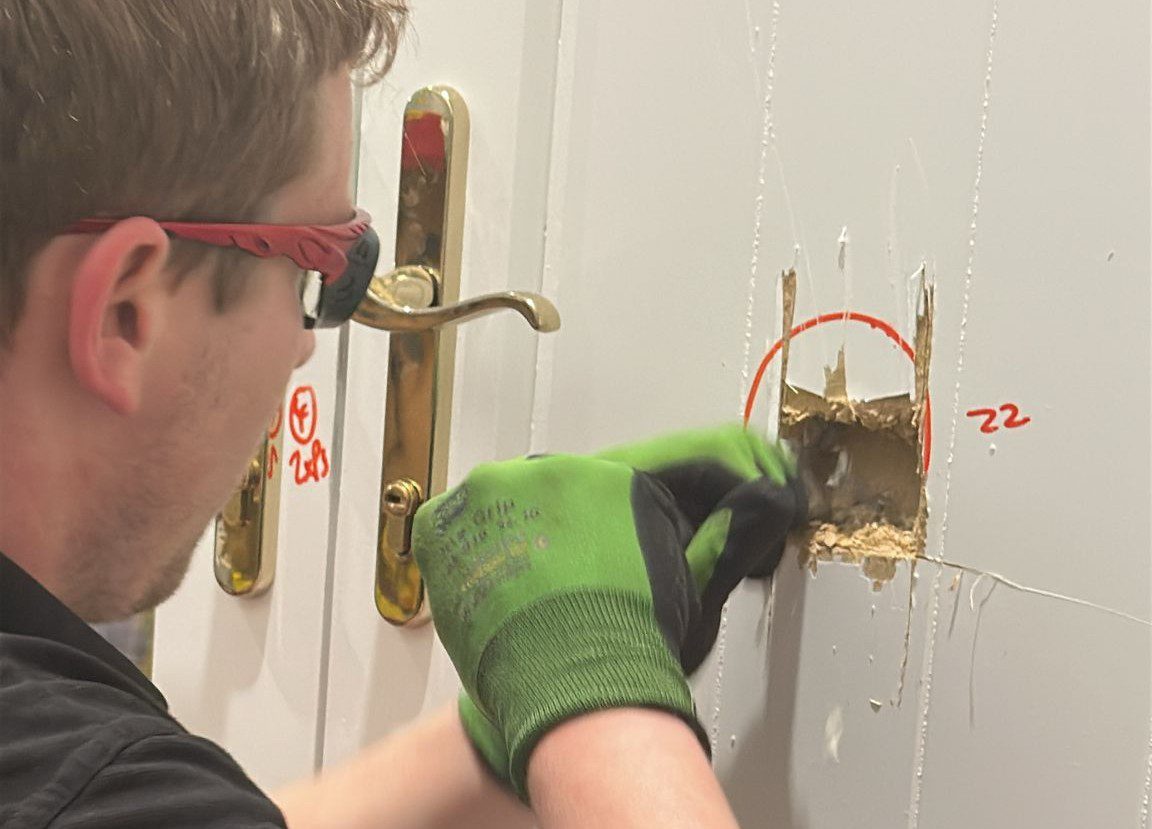Key Takeaways
- PAS 24 certification is essential for meeting Building Regulations Part Q in England and Wales.
- The test simulates real burglary attempts using traditional and modern tools.
- Attacks last up to 15 minutes per method.
- Depending on the test, a product fails if the test cylinder fits through, the door is unlocked and opened, or it no longer functions correctly.
What Is PAS 24?
PAS 24 is a UK security test that checks how well windows and doors resist break-ins. During testing, professionals simulate a burglary using tools that most criminals would carry. Products that pass earn certification proving they meet enhanced security standards.
Why Does PAS 24 Matter?
Builders and homeowners often choose PAS 24 certified products to comply with:
- Building Regulations (Approved Document Q)
- Secured by Design (SBD) guidelines
- NHBC warranties for new builds
This certification helps ensure your windows and doors provide reliable protection against forced entry.
What Happens During PAS 24 Testing?
Certified labs carry out the testing in several stages.
Mechanical Load Testing
Testers apply both pushing and pulling forces to vulnerable areas like locks, hinges, and glazing beads. Specifically, they use:
- 3kN push force for 10 seconds
- 1kN pull force for 10 seconds
If the force creates a gap large enough for a 150mm x 50mm test cylinder, the product fails. This represents the space an intruder needs to reach in or operate a lock.
Manual Attack Testing
Attackers use tools like crowbars, screwdrivers, and chisels. Each method gets up to 15 minutes of active attack time. Testers target:
- Locking points
- Hinges and fixings
- Glazing systems
- Door panels
- Hardware such as handles or letter plates
The goal is simple — create a hole large enough to fit the test cylinder.
Cutting and Manipulation Tests
The cutting test (Z1) uses a Stanley knife, 6mm chisel, and 25mm chisel. Testers are given 3 minutes to try and bypass seals, fixings, or panels.
In the manipulation test (A), testers use non-destructive tools such as paint scrapers and credit cards to disengage locks and restrictors. A successful bypass within 15 minutes results in failure.
Impact and Cylinder Testing
Impact and cylinder tests simulate common break-in tactics. They check whether products can resist blunt force and direct attacks on the locking system.
Impact Tests
- A 25kg soft body weight is dropped from 800mm to simulate a kick or shoulder barge.
- A 50kg battering ram is dropped from 165mm. It strikes:
- Corners
- Hinges and lock points
- Glazing edges and silicone lines (3 strikes per location)
Cylinder Lock Testing (Doors Only)
- Snap and Pull: Two screws are inserted into the cylinder. A claw bar is used with up to 180Nm of force to remove it (3-minute limit).
- Plug Extraction: The lock’s core is attacked using drills or pulling tools.
- Handle/Escutcheon Attack: Tools target the handle area to disable the cylinder. The door only fails if it can be unlocked and opened within 3 minutes.
Functionality and Structural Testing
PAS 24 also tests how well a product functions under stress. This ensures security doesn’t compromise usability.
Operational Function
- A 60kg weight is applied to the sash (windows) or door leaf.
- Windows must open and close within permitted force limits.
- Doors must self-close and return to position.
- Locks, handles, and hinges must still operate properly.
Static Torsion Test (Windows & Doors)
A twisting force checks whether the product remains square and usable when subjected to uneven stress.
Racking Test (Doors Only)
Diagonal force simulates building movement. The door must stay aligned and fully operational.
Vertical Load Test (Windows Only)
A downward force tests whether the window sags or binds under its own weight. It must remain within tolerance and fully functional.
Load Bearing Test (Windows & Doors)
A direct downward force is applied to the sash or door head. The product must support this load without distortion or loss of performance.
What Is Cyclic Testing in PAS 24?
Cyclic testing is a durability assessment that simulates years of real-world use. As part of PAS 24, the product is repeatedly opened and closed to ensure it can withstand daily wear and tear without losing functionality or security performance.
- Windows are tested for 10,000 open-close cycles
- Doors are tested for 50,000 open-close cycles
This rigorous testing confirms that:
- Locks, hinges, handles, and mechanisms continue to operate smoothly
- The unit stays structurally aligned and secure
- There’s no loosening, warping, or failure of components
- Security features remain fully functional, even after prolonged use
What Changed in the 2024 PAS 24 Update?
The updated PAS 24:2022+A1:2024, released in September 2024, addresses newer burglary techniques. Key changes include:
- Thermal attacks — Tests now check if freeze sprays can weaken materials
- Expanded tools — Syringes, superglue, and water simulate more advanced criminal methods
- Better alignment with TS 007 standards — Cylinder security is tested more thoroughly
- Clearer test guidance — Ensures consistent results across different labs
These updates help make PAS 24 more robust and reflective of modern threats.
How Does PAS 24 Compare to RC3 and RC4?
Although both PAS 24 and RC (Resistance Class) ratings test burglary resistance, they serve different purposes.
- PAS 24 is the UK standard required for Part Q compliance
- RC ratings (from European EN 1627) range from RC1 to RC6
- RC2 is not enough, as it skips tests with crowbars
- RC3 is broadly similar but still not a substitute for PAS 24
- RC4 offers higher security but does not automatically meet UK building regulations
Therefore, if your project needs to comply with Part Q, you must specify PAS 24 — RC ratings alone are not accepted.
Who Provides PAS 24 Certification?
Only UKAS-accredited testing bodies, such as BSI, UL or BM TRADA, can certify PAS 24 compliance. It’s important to remember that certification applies only to the exact product specification tested. Any changes to materials or hardware could invalidate the result.
Need PAS 24 Certified Timber Windows and Doors?
We supply timber windows and doors that meet PAS 24 standards, offering security, durability, and craftsmanship.
Contact us today to discuss your project.

